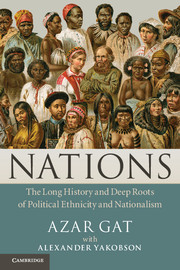Book contents
- Frontmatter
- Contents
- Acknowledgments
- 1 Introduction: is nationalism recent and superficial?
- 2 The evolution of kin–culture communities
- 3 From tribes to statehood
- 4 Premodern ethne, peoples, states, and nations around the world
- 5 Premodern Europe and the national state
- 6 Modernity: nationalism released, transformed, and enhanced
- 7 State, national identity, ethnicity: normative and constitutional aspects
- Conclusion
- Notes
- Index
7 - State, national identity, ethnicity: normative and constitutional aspects
Published online by Cambridge University Press: 05 February 2013
- Frontmatter
- Contents
- Acknowledgments
- 1 Introduction: is nationalism recent and superficial?
- 2 The evolution of kin–culture communities
- 3 From tribes to statehood
- 4 Premodern ethne, peoples, states, and nations around the world
- 5 Premodern Europe and the national state
- 6 Modernity: nationalism released, transformed, and enhanced
- 7 State, national identity, ethnicity: normative and constitutional aspects
- Conclusion
- Notes
- Index
Summary
This chapter addresses the subject of the book from a specific angle: it examines the manner in which ethnic and national identities, and the connection between them, find expression in constitutional definitions and norms of contemporary states. Modern constitutional texts, reflecting the pivotal importance of the principle of equality in modern democratic doctrine, strongly emphasize the universal rather than the particular. There is an inevitable tension between this universalism and any kind of official connection between the state and a specific national identity, culture, and language, unless these are regarded as common to all the state’s citizens. Nevertheless, the importance of national and cultural identity to the people (or peoples) in question is such that these factors do regularly find expression not merely in actual official and societal practice, but in the country’s credo – its constitution. While modern states commit themselves solemnly to civic equality, they neither practice nor pretend to practice cultural neutrality in their constitutional texts. Of course, the question of neutrality or lack of it arises only if there are significant cultural differences within the citizen body; but such differences are very much the rule. The usual way to protect a cultural minority group (whether or not it is officially defined as a national minority) from discrimination and cultural oppression on the part of the majority is to safeguard its civic and cultural rights in the constitution. This is often done. However, where there is a minority there is also, by definition, a majority. It is often forgotten in the scholarly discourse that the very existence, and acknowledged distinctness, of a cultural minority also indicates the existence of a cultural majority. And its significance – more or less inevitable in a democracy based on the popular will – strongly impacts on the identity of the state as a whole.
- Type
- Chapter
- Information
- NationsThe Long History and Deep Roots of Political Ethnicity and Nationalism, pp. 328 - 379Publisher: Cambridge University PressPrint publication year: 2012
- 1
- Cited by



